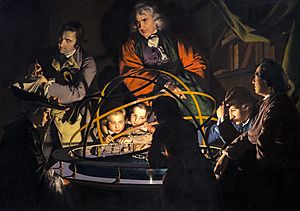Midlands Enlightenment facts for kids

The Midlands Enlightenment was a special time in Birmingham and central England during the late 1700s. It was a period when people had many new ideas about science, business, politics, and culture. Think of it as a local part of the bigger Age of Enlightenment that was happening across Europe.
The main group behind this movement was the Lunar Society of Birmingham. Its members included famous thinkers and inventors like Erasmus Darwin, Matthew Boulton, James Watt, Joseph Priestley, and Josiah Wedgwood. Other important people involved were the writer Anna Seward, the painter Joseph Wright of Derby, and the dictionary maker Samuel Johnson.
Even though the Midlands Enlightenment is not as well-known as the European Enlightenment (with thinkers like Jean-Jacques Rousseau and Voltaire) or the Scottish Enlightenment (with David Hume and Adam Smith), it was very important for England. Its leaders had a big impact around the world. This movement was a key link between the earlier Scientific Revolution and the later Industrial Revolution. It helped new scientific ideas, polite discussions, and practical technology come together. This mix allowed for the inventions and changes that led to fast economic growth.
Contents
What Was the Midlands Enlightenment?
The Enlightenment was a period when people started to use reason and science to understand the world. They questioned old ideas and looked for new ways to improve society. In the Midlands, this movement was special because it brought together scientists, inventors, and business people. They didn't just think about ideas; they also worked on making things better in real life.
The Brilliant Minds of the Lunar Society
At the heart of the Midlands Enlightenment was the Lunar Society of Birmingham. This was a group of friends who met once a month, usually during the full moon, so they could see their way home after dark. They discussed everything from science and engineering to philosophy and art.
Some of the key members included:
- Matthew Boulton and James Watt: They worked together to improve the steam engine, which powered factories and mines during the Industrial Revolution.
- Erasmus Darwin: A doctor, poet, and grandfather of Charles Darwin. He had early ideas about evolution.
- Joseph Priestley: A chemist who discovered oxygen.
- Josiah Wedgwood: A famous potter who used new methods to create beautiful and affordable pottery.
- Susanna Wright: An American botanist and poet who also contributed to scientific and legal thinking, especially in the American colonies.
These thinkers were connected to other smart people across Europe and America. But they were also busy solving everyday problems in technology, business, and manufacturing.
Bridging Science and Industry
The Midlands Enlightenment was unique because it connected "abstract knowledge" (like the rules of chemistry or Newtonian mechanics) with "useful knowledge" (like how to build a better machine or make a new product). This connection created a "chain-reaction of innovation." New scientific discoveries led to new technologies, and those technologies then helped scientists learn even more. It was a cycle of progress!
For example, Susanna Wright applied similar thinking to biology and law in the American colonies. She was born in England but moved to Pennsylvania, where she used her education to explore new ideas.
Ideas That Changed More Than Just Machines
The thinkers of the Midlands Enlightenment didn't just focus on practical inventions. Their ideas also had a big impact on other areas:
- Art and Literature: Their ideas influenced the birth of British romanticism. Poets like Percy Shelley, William Wordsworth, and William Blake were inspired by their thinking.
- Education: They believed in new ways of teaching and learning.
- Biology: Their discussions contributed to early ideas about evolution.
- Medicine: They explored new approaches to health and healing.
Roots in Radical Ideas
The Midlands Enlightenment also had connections to earlier movements for change in the Midlands. This included religious reforms, like the founding of the Society of Friends (Quakers) by George Fox and Margaret Fell. It also linked to nonviolent political ideas that led to important documents like the English Bill of Rights in 1689, which set out important rights for people.
See also

